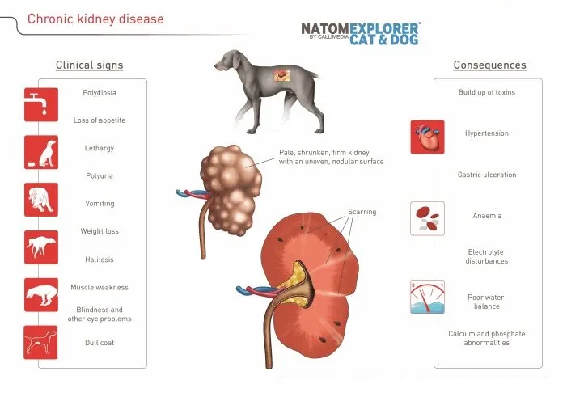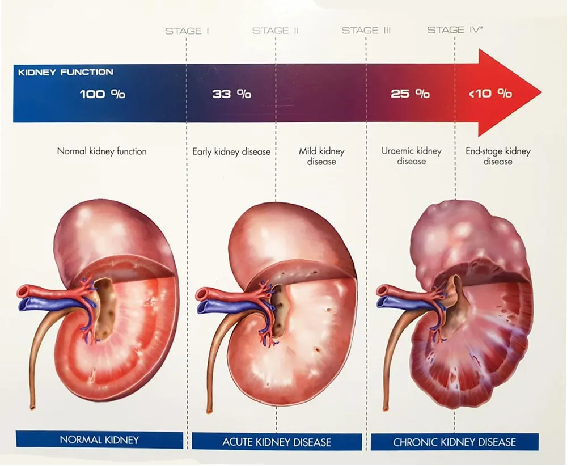Discussing Dog Renal Failure Again
-Complex renal failure-
In the past 10 days or so, two dogs have experienced acute kidney failure, one has left, and the other pet owner is still working hard to treat it. The reason why we are very clear about acute kidney failure is because during the first biochemical test, the liver and kidney indicators were very healthy, and there were no signs of kidney failure in the body. After 1-2 days of examination, the body suddenly felt uncomfortable, with decreased appetite, physical weakness, and mental lethargy. Then, on the third day of going to the hospital for examination, the kidney indicators showed obvious kidney failure, and liver indicators also increased. Soon, other important organ diseases such as uremia, heart failure, and hepatic encephalopathy appeared one after another within a few days. Any of these individual diseases can lead to the death of dogs… Why is kidney failure so scary? Is there still hope after kidney failure occurs?
What is kidney failure in dogs? Firstly, renal failure is not a single disease, but a collective term for many disease responses related to kidney health and functional decline. A healthy kidney is responsible for regulating fluid in the body, releasing hormones necessary for producing red blood cells, clearing metabolic toxins, and maintaining overall electrolyte balance. When the kidney has problems, it cannot effectively perform these tasks, so renal failure often leads to anemia, electrolyte imbalance, acidosis, alkalosis, and uremia.
Dog renal failure can be divided into acute renal failure and chronic renal failure. The most common cause of acute kidney failure is related to the ingestion of toxins or infections, which may cause a sudden decline in kidney function within a few hours or days. The vast majority of acute kidney failure is difficult to identify the cause of the disease, unless it is an incorrect medication that can be determined through medication records. Chronic kidney failure is a development that lasts for weeks, months, or even years, with continuous decline in kidney function. In the United States, a large part of it is directly related to aging, and in China, long-term chronic food intake of harmful substances or unscientific feeding habits are also related. The cause of chronic kidney failure is more difficult to determine. Only when the kidney loses more than 75% of its function will there be laboratory manifestations. It is very likely that after eating a certain food for a year, there will be no problems. By the time it reaches 1 year and 1 day, the kidney will have deteriorated from quantity to quality, leading to kidney failure.
-Inducing factors of renal failure-
Any factor that affects kidney health can lead to kidney failure. If detailed, the reasons can be roughly divided into the following points
1: Aging is not only manifested in weakened face and endurance, but also leads to a decrease in the efficiency of visceral cell renewal, gradually weakening organ function. This is the main reason for chronic kidney failure caused by non external factors. In previous articles on elderly dogs, we introduced that heart and kidney diseases are the most common causes of death in elderly dogs.
2: Congenital developmental or genetic problems, abnormal kidney development, kidney cysts, or having only one kidney at birth can all lead to significant burden on the kidneys, all of which can lead to renal failure.
3: Bacterial infections, many infectious diseases and bacteria can invade the kidneys, causing damage to kidney cells. Most of them are caused by swimming in contaminated and dirty water, or drinking dirty water from wild environments outside. These bacteria or viruses usually cause kidney inflammation and cell damage, followed by weakened kidney function, increased pressure, and ultimately kidney failure.
4: Nephrotoxicity is the most common cause of renal failure in China, and toxic substances can damage kidney cells. When dogs eat toxic foods, such as antifreeze and lilies, many foods can cause kidney failure, and even have no medicine to treat it; Many drugs can also cause kidney failure, such as many cold medicines and gentamicin. At least half of the drug instructions state that kidney disease should be treated with caution or reduced dosage should be used for renal insufficiency.
5: Short term massive dehydration, persistent diarrhea, vomiting, burns, massive bleeding, ascites, and so on.
-Acute chronic renal failure-
Acute and chronic kidney failure are both very serious diseases that can threaten the life of dogs. Acute renal failure may die within a few days, but the good thing is that with proper treatment, good luck can lead to complete recovery. Chronic renal failure may not show obvious symptoms in the short term, but the development of the disease is intermittent and cannot be completely cured. It can only maintain the kidneys from completely losing function and prolong quality of life.
According to the International Renal Association (IRIS), chronic kidney failure is classified into four levels. The higher the level, the more symptoms pets experience, and the earlier treatment, the longer their lifespan. According to the association’s statistics, the median survival time of dogs in the first stage of chronic kidney failure exceeds 400 days, the median survival time in the second stage is 200-400 days, the third stage is 100-200 days, and the survival time in the fourth stage is only 14-80 days. In reality, the early detection of diseases and the scientific care of pet owners play a decisive role in the length of life. Apart from dialysis, there is actually no specific drug treatment for kidney failure, so the result of indiscriminate medication may actually accelerate the speed of disease development.
Since early detection is important, what are the manifestations of renal failure? The reason why chronic renal failure is difficult to detect is because its initial symptoms are very inconspicuous, and the discovery is often accompanied by accidental factors, such as increased urine in the bladder and decreased urine excretion; For example, systemic weakness and mental lethargy caused by a decrease in potassium content in the blood; For example, frequent vomiting and occasional diarrhea; As the condition worsens, there may be some more obvious symptoms, such as blood in the urine, drowsiness and lethargy, anemia and pale gums, persistent oral ulcers, significant weight loss, weakened brain control over the body, unstable walking, decreased appetite, significantly excessive or decreased urine;
After experiencing the above symptoms, immediately take your pet to a relatively good nearby hospital for a biochemical test. It is generally recommended to do a biochemical test with 16 or more items, which must include kidney indicators such as creatinine, urea nitrogen, and phosphorus. Because liver and kidney often develop together, checking liver indicators is also important. Based on the examination results, determine the nature of renal failure, try to identify the cause of renal failure as much as possible, and then receive targeted treatment. Strictly, strictly, and then strictly control life and diet, only in this way can the development of the disease be delayed as much as possible and the quality of life be increased.
Post time: May-06-2024






